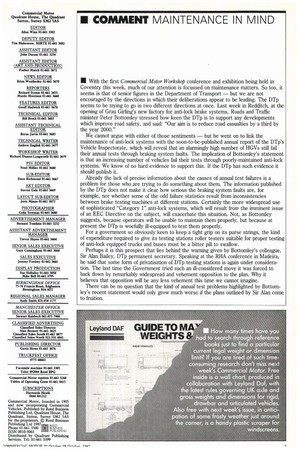• COMMENT MAINTENANCE IN MIND
Page 5

If you've noticed an error in this article please click here to report it so we can fix it.
• With the first Commercial Motor Workshop conference and exhibition being held in Coventry this week, much of our attention is focussed on maintenance matters. So too, it seems is that of senior figures in the Department of Transport — but we are not encouraged by the directions in which their deliberations appear to be leading. The DTp seems to be trying to go in two different directions at once. Last week in Redditch, at the opening of Grau Girling's new factory for anti-lock brake systems, Roads and Traffic minister Peter Bottomley stressed how keen the DTp is to support any developments which improve road safety, and said: "Our aim is to reduce road casualties by a third by the year 2000."
We cannot argue with either of those sentiments — but he went on to link the maintenance of anti-lock systems with the soon-to-be-published annual report of the DTp's Vehicle Inspectorate, which will reveal that an alarmingly high number of HGVs still fail their annual tests through braking system faults. The implication of Bottomley's statement is that an increasing number of vehicles fail their tests through poorly-maintained anti-lock systems. We know of no hard evidence to support this. If the DTp has such evidence it should publish it.
Already the lack of precise information about the causes of annual test failures is a problem for those who are trying to do something about them. The information published by the DTp does not make it clear how serious the braking system faults are, for example, nor whether some of the odd failure statistics result from inconsistencies between brake testing machines at different stations. Certainly the more widespread use of sophisticated "Category 1" anti-lock systems, which will result from the imminent issue of an EEC Directive on the subject, will exacerbate this situation. Not, as Bottomley suggests, because operators will be unable to maintain them properly, but because at present the DTp is woefully ill-equipped to test them properly.
For a government so obviously keen to keep a tight grip on its purse strings, the kind of expenditure required to give its testing stations roller testers suitable for proper testing of anti-lock equipped trucks and buses must be a bitter pill to swallow.
Perhaps it is this prospect that lies behind the warning given by Bottomley's colleague, Sir Alan Bailey, DTp permanent secretary. Speaking at the RHA conference in Madeira, he said that some form of privatisation of DTp testing stations is again under consideration. The last time the Government tried such an ill-considered move it was forced to back down by remarkably widespread and vehement opposition to the plan. Why it believes that opposition will be any less vehement this time we cannot imagine.
There can be no question that the kind of annual test problems highlighted by Bottomley's recent statement would only grow much worse if the plans outlined by Sir Alan come to fruition.












































































































































































